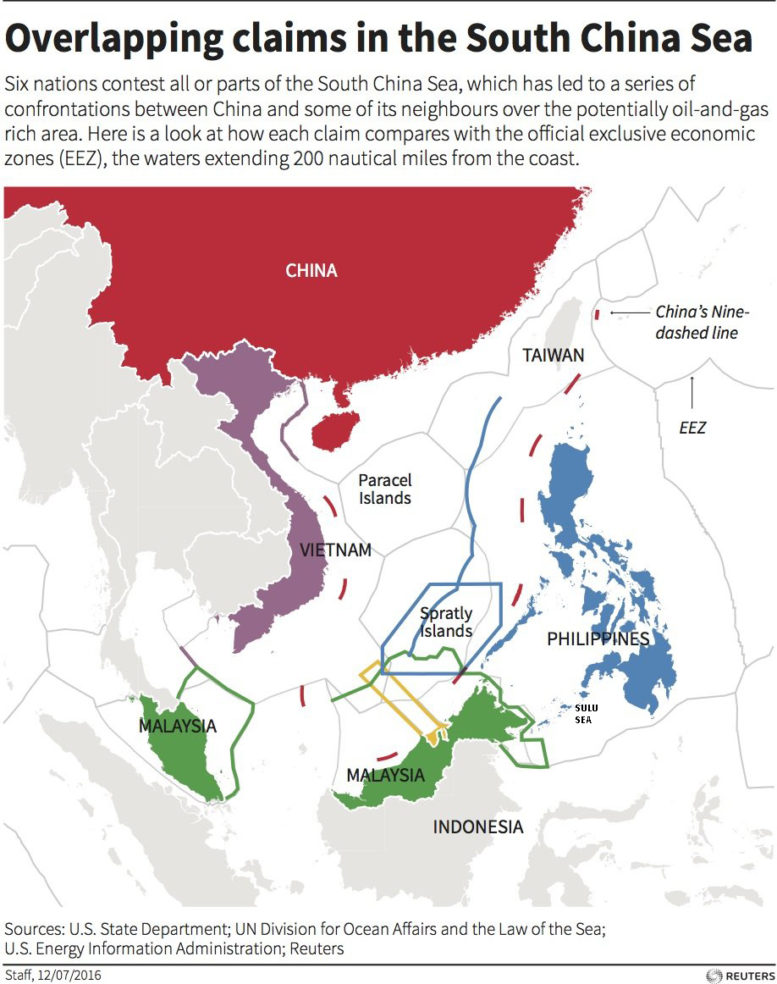Many security challenges beset the nation as it welcomes 2018. At the domestic front, the continuing violent activities of the terrorists and other lawless armed groups in Mindanao and Sulu Sea necessitate extension of martial rule and increased deployment of security forces. Apart from armed conflict the detrimental effects of ecological imbalance brought about and expected to induce calamities and disasters. These require huge outlay of government funds for peace-building, humanitarian assistance and disaster response. At the external front, the lingering crisis in the Korean peninsula and the incessant build-up and strengthening of military structures in the South China Sea, particularly in the Spratly and Paracel Island Groups, keep various countries busy calibrating their foreign policy and revisiting their contingency plans.
The nuclear threat of North Korea has both worldwide and regional repercussions. This will not directly impact on freedom of navigation in the country’s waterways. But the excessive maritime claims in the South China Sea and the numerous piracy incidents in Sulu Sea put the freedom of navigation of the ASEAN member-states and the Philippines at risk. The South China Sea carries trade goods worth US$4-5 trillion annually, and many littoral countries lay partial claim of ownership.
Already two superpowers, China and U.S., have increased their presence in the South China Sea. China constructed and upgraded 3 military bases in the Spratlys in the past 5 years and declared maritime zones around those installations, in contravention of certain UNCLOS provisions.
Consequently, the US Navy conducted several freedom of navigation operations (FONOPS) to challenge excessive maritime claims that could curtail freedom of the seas. In 2017, ASEAN defense leaders agreed to craft a Code of Conduct in this vital waterway to avoid unwarranted incidents therein. The Philippine case in the Permanent Court of Arbitration brought to fore the importance of the UNCLOS in maintaining freedom of navigation particularly in the South China Sea.
On the other hand, the Sulu Sea has become a pirates’ haven and regarded as the fastest growing piracy hotspot that pose danger to commercial shipping and seafarers. The Sea connects Brunei, Indonesia, Malaysia and the Philippines, known as the East Asia Growth Area. Ships from other countries also pass through Sulu Sea. Traditional pirates aim for financial gain for themselves but some abduct ships to generate funds for dissident groups. In March to November 2016, there were 9 piracy incidents in Sulu Sea involving 44 kidnapped victims, some of whom were killed.
The gravity of the situation led to the formation of the Trilateral (Indonesia, Malaysia and Philippines) Border Patrol Arrangement for monitoring and response and established 3 contact points: Zamboanga City, Bongao (Tawi-tawi) and Lahad Datu (Sabah). This multinational creation prevented escalation of piracy cases in Sulu Sea in the past year. Only consistent, unannounced border patrols and close coordination among the 3 countries’ maritime forces will assure freedom of navigation in Sulu Sea.
The Chinese military presence in South China reflects a changed maritime strategy along the lines advanced by U.S. naval strategist Mahan: establishment of bases to support the battle fleet and protect the sea lines of communications (SLOC) for the merchant fleet to continue unhampered access to the sea. The Chinese also appear to have learned the US strategy to “follow the oil” as the South China Sea is known to hold considerable deposits of fossil fuel and natural gas enough to support China’s energy requirements.
The current actions of China vis-à-vis South China Sea are the result of a long and deliberate planning by the Chinese leaders starting with Deng Xiaoping. A former Chinese ambassador to the Philippines, when asked about China’s intention in South China Sea, said in 1999 that the Chinese people would leave the decision to their future leaders.
China, a signatory to UNCLOS, however appears to violate the fundamental law of the sea and threatens not only freedom of navigation but also the marine environment. Despite assurances by its present leaders that the military bases would not interfere with merchant shipping passage, only time can tell.
Meantime, the mostly affected nations may as well enhance their capability to protect their own merchant vessels, adopt a flexible foreign policy towards the key players in South China Sea, and request the UN to encourage its members to observe the UNCLOS provisions that ensure freedom of navigation. While the US Navy FONOPS provide actual ground observation, those operations are dangerous and they deserve recognition for testing “uncharted waters” for the benefit of the world maritime community.
Freedom of navigation guarantees wealth generation for all nations. Let’s keep it for the sake of peace, prosperity, and stability in our continually challenging maritime environment.
